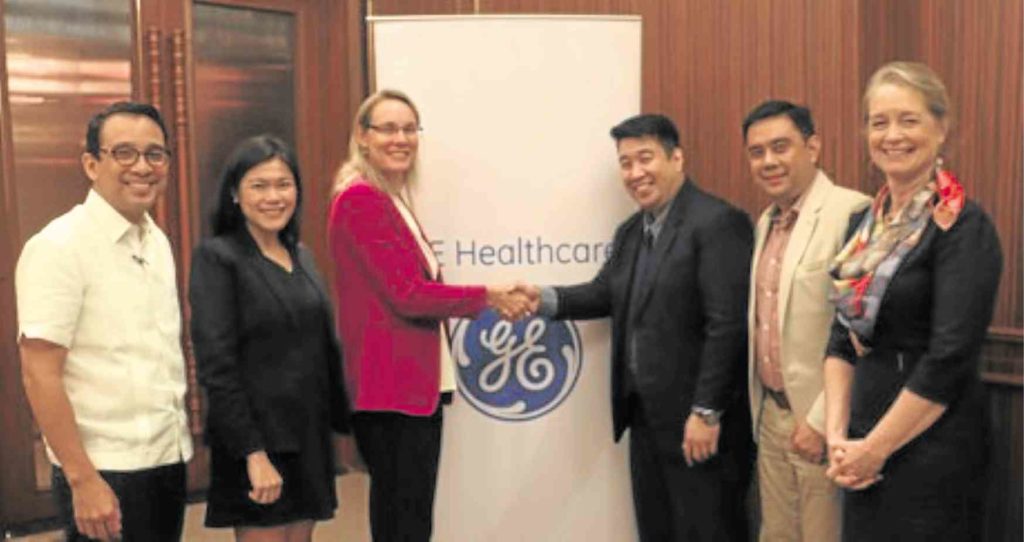FamilyDoc goes to town with an ounce of prevention

PARTNERSHIP FORGED J.V. Emmanuel de Dios, CEO (left), GE Philippines; AC Health’s Dr. Rizzy Alejandro; Myra Eskes, CEO Sustainable Healthcare Solutions–Asean GE Healthcare; Paul Darroca, GM, AC Health; GE Healthcare Philippines Country Manager Michealangelo Chebat; GE Sustainable Healthcare Solutions CEO Terri Bresenham.
Two years since the establishment of FamilyDoc, Ayala Healthcare Holdings, Inc’s (AC Health) chain of “three-in-one” community-based clinics, solidifying its identity still remains an issue.
“People still don’t know what we are. Are we a clinic, a diagnostics center, a pharmacy? In some cases, they think we are a convenience store because we do carry food items, since patients required to fast before blood tests get very hungry,” says Paul Darroca, FamilyDoc general manager.
While still relatively new with only 11 clinics in Cavite, Parañaque and Las Piñas, this identity crisis won’t seem to last too long for FamilyDoc given its goal: To expand its reach in the greater Metro Manila area and have 24 clinics by the end of 2017, and, by 2020, hit its 100th branch mark, creating a primary and preventive care ecosystem in the country.
“Preventive care is very difficult. It’s difficult enough for a patient to go to the clinic if they’re sick; first thing they’ll do is go to the pharmacy, self-medicate, or go to Google and self-diagnose,” says Darroca. FamilyDoc’s main tool in encouraging more people to seek preventive care is their in-house, cloud-based electronic medical record (EMR) system, developed by AC Health’s in-house IT team.
“We like to call it a proactive EMR. We get your vitals using GE equipment, and when you go to the doctor, there are automatic flags [in your record] if you are a high-risk case for, say, diabetes or hypertension,” Darroca explains. “We already have a system wherein it flags the doctor [for these kinds of problems], even if the patient came in only because of a headache or flu. It’s more proactive because usually patients don’t go to the clinic if [their condition] is asymptomatic.”
Article continues after this advertisementThe EMR, which also comes with analytics, also helps FamilyDoc clinics carve their services based on their respective communities’ specific needs. Darroca cites one clinic wherein they discovered, aside from hypertension, a prevalence of asthma among its patients, which led to the addition of a nebulizing facility in that specific branch.
Article continues after this advertisement“We also discovered that 70 percent of our patients are composed of seniors, women and children. So now we offer, for the seniors, free checkups for diabetes and hypertension, free breast exam for women, and a kiddie daycare for children on Saturdays wherein we change the clinic’s look to encourage them to see their doctor,” says Darroca.
GE Healthcare has been working with AC Health since 2015, beginning as its technology provider. The relationship has progressed to a long-term partnership.
“The challenge with universal health coverage in a country where you don’t have that primary care infrastructure is that your secondary and tertiary hospitals are completely overloaded, because everyone has to see a specialist right away. I think in order to get costs down, what Ayala is doing is needed,” says Myra Eskes, president and chief executive of GE Healthcare Asean.
The two companies’ partnership also led to the development of FamilyDoc’s hub-and-spoke growth model.
The 24 clinics FamilyDoc expects to have by the end of the year will be divided into four clusters following this model, with six clinics each in Cavite, Las Piñas, Parañaque, and the Taguig-Pateros area. The hubs will house imaging equipment such as X-ray and ultrasound to cut costs in other clinics, says Darroca. FamilyDoc patients are also given incentives, such as a P50 discount, to avail themselves of these hubs’ imaging services.
FamilyDoc plans to have nine clusters by next year, he adds.
“A secondary or tertiary hospital in an urban center will need equipment which can handle more specialized cases. But if you look at satellite sites where you want to do scanning or screening … You want to have high-quality equipment, well-trained people, but you do not want to have a system with features that in a rural setting will probably never be used. So that’s an important aspect of making healthcare affordable,” says Eskes.